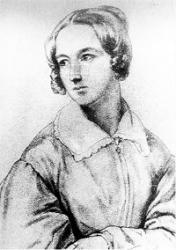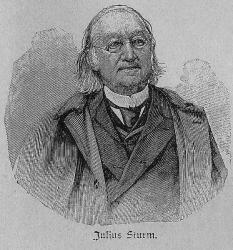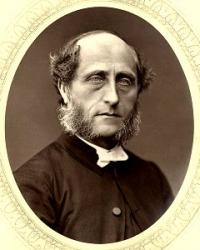
1798 - 1876 Hymnal Number: 149 Author of "To Thee, to Thee, away from Self" in Evangel Songs Text of "Müde bin ich geh zur Ruh" is printed in Lutheran Service Book, 2006 #887
=============
Hensel, Luise, daughter of J. J. L. Hensel, Lutheran pastor at Linum, near Fehrbellin, Brandenburg, was born at Linum, March 30, 1798, Though confirmed as a Lutheran in her fifteenth year, she gradually approximated to Roman Catholicism, and was formally received into that Communion, Dec. 7, 1818. During the remaining years of her life, she devoted herself mainly to the education of the young and the care of the sick. In 1874 she entered the Union of Daughters of Christian Love at Paderborn, and died at Paderborn, Dec. 18, 1876. (O. Kraus, 1879, pp. 204-211; Allgemeine Deutsche Biographie, xii. 1-3, &c.) Her best hymns were written before she was 23, and in proportion as she became an Ultramontane the poetical value of her productions declined. Her finest productions are distinguished by childlike simplicity, humility, resignation, and deep Christian love. They have won wide acceptance in Germany. The first two of those noted may be regarded as nursery classics.
A number of her hymns came into Clemens Brentano's hands as early as 1819, and were by mistake included as his in his posthumous works. A few were printed in F. Förster's Sängerfahrt, 1818, and a good many more in M. Diepenbrock's Geistlicher Blumenstrauss, Sulzbach, 1829. A complete edition of her hymns was published by Professor C. Schlüter of Münster as her Lieder at Paderborn, 1870 (4th ed., 1879).
i. Hymns in English common use:
i. Immer muss ich wieder lesen. [Holy Scripture.] This beautiful children's hymn on the Life of Christ as narrated in the Gospels, appeared in Diepenbrock, 1829, p. 265, in 7 stanzas of 4 lines (entitled "On the reading of Holy Scripture "); and in her Lieder, 1870, is dated Berlin,
1815. It is repeated in Knapp's Evangelischer Lieder-Schlatz, &, 1837, the Württemberg Gesang-Buch, 1842, &c. Translated as:—
Ever would I fain be reading. A good and full translation by Miss Winkworth in her Lyra Germanica, 2nd Ser., 1858, p. 24. It has been included in full in Psalms & Hymns, Bedford, 1859; Kennedy, 1863; Book of Praise for Children, 1881; and in America in Hatfield's Church Hymn Book, 1872, and others. In some collections it is abridged; and in the Unitarian South Place Collection, 1873, it begins, "Ever find I joy in reading."
Other translations are:—
(1) “O how sweet the wondrous story," by Mrs. Bevan, 1859, p. 142. (2) "In that book so old and holy," in Dr. H. W. Dulcken's Golden Harp, 1864, p. 25. (3) "Still I read, and weary never," by “A. M. A," in the British Herald, Feb. 1868, p. 211.
ii. Müde bin ich, geh' zur Ruh. [Evening.] This beautiful child's evening prayer, the most popular of all her hymns, appeared in Diepenbrock, 1829, p. 270, in 4 stanzas of 4 lines. In her Lieder, 1870, p. 54, dated Berlin, Autumn, 1816. Included in the Unverfälscher Liedersegen, 1851, No. 528. Translated as:—
1. Now that o'er each weary head. A free translation of stanzas i.-iii. as No. 22 in C. H. Bateman's Children's Hymns, 1872.
2. Weary now I go to rest. A good translation of stanzas i.-iii. by E. Cronenwett as No. 324 in the Ohio Lutheran Hymnal 1880.
Other translations are:—
(1) "Now I close my tired eyes," by Mrs. Bevan, 1859, p. 147. (2) "I am tir'd, and so I seek," by Miss Manington, 1863, p. 126. (3) "Weary now I go to bed," in Dr. H. W. Dulcken's Golden Harp, 1864, p. 40. (4) “Now with weariness opprest," a second translation by Dr. Dulcken, p. 72. (5) “Wearied now I seek repose," by J. Kelly, 1885, p. 111.
ii. Hymns not in English common use:
iii. Ich liebe einen Königs Sohn. [Love to Christ.] In Diepenbrock, 1829, p. 304, in 9 stanzas, and in her Lieder, 1870, p. 67, dated Berlin, 1817. Translated as "I love a royal only Son," by E. Massie, 1867, p. 174.
jv. 0 Sonne, wenn von deinem Licht. [Love to Christ.] In Diepenbrock, 1829, p. 257, in 6 stanzas, and in her Lieder, 1870, p. 128, dated Söndermühlen, 1823. Translated as "O Sun, if from thy light a ray," in J. D. Burns's Memoir and Remains, 1869, p. 270.
v. 0 Sorge, die mien niederdrückt. [Encouragement.] In Diepenbrock, 1829, p. 271, in 6 stanzas, and in her Lieder, 1870, p. 13, dated Berlin, 1815. The translations are:—(1l) "O anxious care that weighs me down," by Miss Burlingham, in the British Herald, Sept. 1865, p. 144. (2) "Begone, O load of care, begone," by J. Kelly, 1885, p. 80.
vi. Was verlangst du, warumbangst du. [Cross and Consolation.] In Diepenbrock, 1829, p. 261, in 6 stanzas entitled "Suraum corda." In her Lieder, 1870, p. 43, it is dated Berlin, 1816. Translated as "What seekest thou! Why fearest thou," by C. T. Astley, 1860, p. 28.
vii. Zu dir, zu dir, hinweg von mir. [Consecration to Christ.] In Diepenbrock, 1829, p. 267, in 5 stanzas In her Lieder, 1870, p. 31, dated Berlin, 1816. Translated as "To Thee, to Thee, away from self," by J. Kelly, 1885, p. 72. [Rev. James Mearns, M.A.]
-- John Julian, Dictionary of Hymnology
=====================
Hensel, Luise, p. 510, ii., No. v. "O Sorge," &c, appeared in Förster's Sängerfahrt, 1818, p. 266.
--John Julian, Dictionary of Hymnology, Appendix, Part II (1907)
Luise Hensel


 My Starred Hymns
My Starred Hymns







